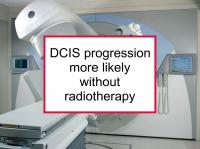Ductal carcinoma in situ (DCIS) is a non-invasive form of breast cancer in which tumor cells are located within the milk ducts and have not spread beyond the duct walls. DCIS can be eliminated with mastectomy, but this is considered overtreatment in most cases since DCIS is not life threatening and might never progress to invasive cancer.
However, women who are treated for DCIS with breast conserving surgery (typically, lumpectomy) are at ongoing risk of a recurrence of DCIS (usually in the same breast but sometimes in the opposite breast). In fact, risk of a recurrence of DCIS or progression to invasive breast cancer continues for at least 20 years.
Now a new long-term study has reported that almost a third of patients will experience a local relapse (of DCIS or invasive breast cancer in the breast, chest wall, or lymph nodes) after a lumpectomy if radiotherapy is omitted.
Latest research finds recurrence risk is high without radiation
The study referenced at the beginning of this news story was designed to determine the long-term risk of developing a local recurrence and its effect on survival after breast conserving treatment for DCIS. Radiation treatment (radiotherapy) after surgery (normally, lumpectomy but can mean partial mastectomy for larger lesions) for DCIS is designed to reduce the likelihood of a local recurrence.
The study included 1,010 women with DCIS tumors of less than 5 cm in diameter who had breast conserving surgery to remove their lesions between 1986 and 1996. The women were randomly assigned either to receive no further treatment (surgery only group) or to receive radiation treatment (surgery+radiation group). The women were followed for a median of 15.8 years.
The addition of radiation treatment to surgery for DCIS was found to reduce the risk of any type of local recurrence by 48%. The 15-year recurrence-free rate was 82% for the surgery+radiation group compared to 69% for the surgery only group. When the 15-year rate of progression to invasive cancer was examined, the authors found that the progression-free rate was 90% for the surgery+radiation group compared to 84% for the surgery only group.
However, the differences in local recurrence rates between the two groups did not translate into significant differences in breast cancer-specific survival or overall survival. Once a recurrence developed, this fact, rather than whether the patient originally had undergone radiation treatment, determined prognosis. Study participants who experienced progression to local invasive breast cancer had markedly worse breast cancer-specific survival and overall survival compared with those who did not experience recurrence.
Women in the surgery+radiation group had a lower overall salvage mastectomy rate after local recurrence than the surgery only group. The authors conclude that, at approximately 15 years after diagnosis of DCIS, almost one in three nonirradiated women had a local recurrence after surgery only. Radiation treatment lowered this risk by a factor of two. Although women who developed an invasive recurrence had worse survival, the long-term prognosis was good and independent of whether radiation had been received.
Please see our article on DCIS prognosis for more information.
